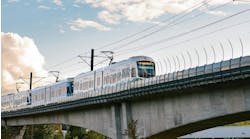OP-ED: Details are still needed for NJ Transit/Amtrak $1.8 billion new Portal Bridge project
Questions still remain after the recent announcement by New Jersey Transit that it has awarded a $1.559 billion contract for construction of the New Portal Bridge on the Northeast Corridor followed by President Joe Biden attending a ground-breaking ceremony for start of construction.
NJ Transit awarded a $1.559 billion contract for construction of the New Portal Bridge on the Northeast Corridor at the October 12 meeting of the NJ Transit Board. During the meeting, the following Action Item was adopted:
PORTAL NORTH BRIDGE PROJECT – AWARD OF GENERAL CONSTRUCTION CONTRACT NO. 20-083X – Authorization to enter into NJ TRANSIT Contract No. 20-083X, with Skanska Traylor PNB JV for the construction of the Portal North Bridge Project in the amount not to exceed $1,559,993,000, plus five percent for contingencies, subject to the availability of funds.
Contingencies would represent $80 million. Just what is the source for these funds which are referenced as "subject to availability"? The actual total project cost is closer to $1.8 billion. Sources include $811 million from New Jersey Transit, $766 million from the Federal Transit Administration (FTA) under a Full Funding Grant Agreement (FFGA), $261 million from Amtrak and $37 million from the Federal Highway Administration (FHWA).
Where is the detailed project budget to reflect the overall total cost? A real detailed project budget would include the estimated costs for each project component along with funding source FTA, NJ Transit, FHWA, Amtrak or a combination of more than one source. This would include, but not be limited to planning, environmental review, design and engineering, overall construction, track, signal and power work, construction management firms to supplement NJ Transit engineers in oversight of Third Track Contractors schedule, budget, staff and work, NJ Transit and Amtrak force account (NJ Transit and Amtrak track employees who provide protection for construction contractors employees working on active track rights-of-way. They also perform some work not assigned to the contractor), NJ Transit budget and financial staff, NJ Transit quality assurance and quality control staff (to insure that the contractors adheres to the contract specifications and requirements) and funding reserve to pay for change orders due to unforeseen site conditions or changes in scope requested by various NJ Transit and Amtrak user groups. This just highlights a few of the major project cost components.
If NJ Transit shared this information with commuters, residents, taxpayers, transit advocates, elected officials and the media, it would help build credibility for this project. It would also honor New Jersey Gov. Phil Murphy's promise to have the most transparent administration in history.
No one can predict over the coming years the future for Portal Bridge during construction. We first have to see the detailed project construction schedule submitted to and accepted by NJ Transit. It would show the scheduling of work week by week, month by month and year by year from start to finish. This is usually adopted within 90 days after contract award. There is always the potential for adverse weather conditions or other disruptions in service that could require additional time. We also do not know how much float time will be built into the project schedule to deal with any potential delays until it is made public.
Any final project cost could increase based upon change orders during construction due to last minute changes in scope or unforeseen site conditions, inspection and acceptance of all work that also includes quality assurance and quality control during construction followed by beneficial use, completion of contract punch list items (to insure contractor built the asset to meet design and engineering contract specifications), receipt of asset maintenance manuals followed by contract(s) closeout, release of retain age and final payment.
It will be also be interesting to learn about future track outages and service changes necessary to support construction. Some of these details will be revealed when both NJ Transit and Amtrak release their respective 2022 Master Agency Annual Force Account and Track Outage Plans. Other details could be provided by NJ Transit by making public the FTA Full Funding Grant Agreement and FHWA grant.
Amtrak's $305 billion Northeast Corridor High Speed project calls for the introduction of equipment that will operate at a speed of 180 mph. It is my understanding that the new Portal Bridge has been designed and will be built to accommodate increasing speeds from the current 60 mph to only 90 mph. Did anyone notice that this conflicts with Amtrak's long-term plans to reduce travel time by increasing speeds up to 180 mph along the Northeast Corridor including crossing the future new Portal Bridge?
FTA will assign staff from the Region 2 New York Office (it serves New York and New Jersey) along with its own Project Management Oversight (PMO) independent engineering consulting firm to keep a detailed, close eye on a capital improvement project of this size from pre-construction to completion. They will closely monitor the project management plan, scope of work, construction schedule including the critical path, budget, buy America, change orders, track outages, force account, quality assurance, quality control and asset maintenance plans. The PMO will issue monthly reports shared with FTA and NJ Transit senior management along with their respective engineers assigned to the project. This will compliment NJ Transit and Amtrak's own independent construction oversight consulting firm.
Commuters, taxpayers, transit advocates, elected officials, transportation reporters and project advocates deserve answers to these questions before the contractor completes mobilization of its own work forces and materials prior to the start of actual construction. At the end of the day, everyone is looking for safe and reliable service with capital improvements paid for that are fair and reasonable.
------
Larry Penner is a transportation advocate, historian and writer who previously worked for the Federal Transit Administration Region 2 New York Office. This included the development, review, approval and oversight for billions in capital projects and programs for the MTA, NYC Transit, Long Island Rail Road, Metro North Rail Road MTA Bus, New Jersey Transit along with 30 other transit agencies in NY & NJ.

Larry Penner
Larry Penner is a transportation advocate, historian and writer who previously served as a former director for the Federal Transit Administration Region 2 New York Office of Operations and Program Management. This included the development, review, approval and oversight for billions in capital projects and programs for New Jersey Transit, New York Metropolitan Transportation Authority, NYC Transit bus, subway and Staten Island Railway, Long Island and Metro North railroads, MTA Bus, NYCDOT Staten Island Ferry along with 30 other transit agencies in New York and New Jersey.


